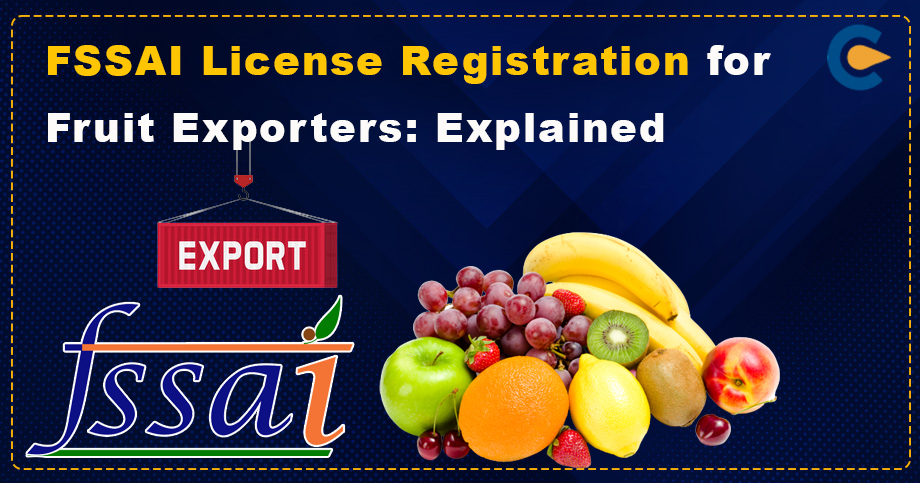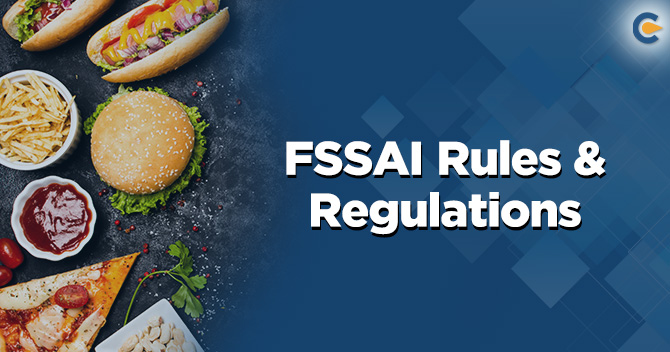Fruit is a perishable commodity that has a limited shelf life. Businesses or individuals intending to start a fruit export from India need to operate in a legalized way and are hence required to obtain an FSSAI license. In this write-up, we will dig into every facet of FSSAI License Registration for Fruit Exporters and its benefits.
Role of FSSAI and its Importance for the Fruit Business
FSSAI is an apex government institution entrusted with the responsibility of regulating and overseeing food businesses in India. Regardless of business revenue or market footprint, Food Business Operators, including fruit businesses, must register with FSSAI. FSSAI’s ultimate goal is to ensure the availability of safe and hygienic food articles for customers. FSSAI has penned some penal provisions for breaching its guidelines or directions.
But FSSAI registration is not the only legal permission required by the applicant for dispatching their consignment abroad. IEC, or the Import-export code, is one of the essential legal permits an applicant needs to secure from the Directorate General of Foreign Trade. Without it, FSSAI won’t be issuing their approval for the license.
An Overview of the ‘Clean & Fresh Fruit & Vegetable’ Initiative launched by FSSAI
The apex food regulator FSSAI rolled out the ‘Clean and Fresh Fruit and Vegetable’ initiative to oversee the organized and unorganized retail fruit market. It provides for the safe handling and processing of fruit and vegetables available to the masses.
Since fruits have a low shelf life, their distribution or storage is daunting. Local fruit retailers play a pivotal role in fruit distribution. Most such retailers leverage ripening agents and harmful chemicals to preserve and sell fruits. Therefore, FSSAI came up with this initiative and penned down norms for safety and hygiene that every retailer must follow.
The retail sector dealing with fresh fruit produce is categorized under the following heads:
- The organized retail sector encompasses Big Bazar,Reliance Fresh, Nature’s Basket, APMCs, Big Basket, etc.
- The unorganized retail sector comprises non-permanent shops, pavement vendors, pushcart vendors, and mandis.
- The FSSAI initiative seeks to regulate both organized and unorganized retail sectors’ fruit produce.
The fundamental norms that the retail sector must comply with are as follows:
- All fruit and vegetable vendors must avail of Registration under the Food Safety & Standards (Licensing & Registration of Food Business) Regulations, 2011[1].
- The vendor must show their FSSAI registration number with the green colour code on their cart, shop, or kiosk.
- The vendors should avoid using carbide gas or acetylene gas for fruit ripening. However, they can use ethylene gas from a legitimate source of up to 100 ppm.
- The vendors should avoid affixing stickers on fruits that serve no purpose. Stickers that reflect helpful information on the fruit should not be backed by adhesives and inks that are detrimental to human health.
- Coating hazardous chemicals, mineral oils, and other colouring materials on fruits and vegetables are prohibited.
- The vendors are allowed to use carnauba wax, beeswax, or shellac wax for fruit or vegetable coating. The wax-coated fruits should be labelled as “Coated with wax (name of wax).”
Under this initiative, the local authorities will identify suitable markets and vendors for the FSSAI. The state FDA officers will audit and vet the business premises. The officials will deploy the apt changes and encourage the vendor to fulfil the initiative’s guidelines.
The FSSAI panel will audit the changes implemented by the officials. Post-error-free audit, they will be accorded with the ‘Clean and Fresh Fruit and Vegetable Market Certification.’ The Registration will remain valid for one year. Needless to say, any negligence in this regard would incur hefty penalties for the defaulters.
Benefits of FSSAI License Registration for Fruit Exporters
Despite being mandatory, the FSSAI License Registration for Fruit Exporters lets business owners reap the following benefits:
- Amplified Business Presence: FSSAI has a globally-recognized presence and is treated among the most prolific standards for food safety and management worldwide. Being registered under FSSAI means that your business would garner immense credibility over time, translating to improved sales.
- Improved sales: These days customers have become more concerned about product quality than its appearance or weight. Now they are reluctant to buy any product lacking the authority’s approval or mark. The same is true for food articles. With the FSSAI number and mark on board, you can expect more customers buying your products.
- No legal hassles: You are less likely to encounter legal hassles if you perform your business undertaking around FSSAI’s norms. That means no legal authority will come your way if you stay in line with the provisions mentioned in the FSS Act 2006.
Different Types of FSSAI License Registration for Fruit Exporters
Following are different types of FSSAI License Registration for Fruit Exporters
- FSSAI Basic Registration: It covers food business operators whose yearly income is lower than Rs 12 Lacs.
- FSSAI State License: It applies to food businesses earning an annual income ranging between Rs 12 lacs to Rs 20 crore.
- FSSAI Central License: FSSAI Central License covers FBOs whose yearly turnover is more than Rs 20 Crores and who have an operating footprint in two or more states.
Mandatory Documents Concerning FSSAI License Registration for Fruit Exporters
Following are some crucial documents required for FSSAI License Registration for Fruit Exporters:
- ID Proof confirming the identity of the business owners
- Evidence related to the business’s address
- Import/Export Code, i.e., IEC registration granted by the Directorate General of Foreign Trade.
- List of active directors serving the company along with their ID proof.
- Memorandum of Association & Articles of Association drafted as per norms of the Companies Act, 2013
- Certificate of Incorporation granted by the Ministry of Corporates Affairs under the Companies Act, 2013.
- Partnership Deed (if the business is partnership-based) is enforced under the Partnership Act, 1932.
- List of Fruits to be exported
- Cold Storage License, if applicable
- NOC accorded by the respective Municipal Corporation
- Food Safety Management System Plan
- Certificate accorded under the Coop Act, 1861
Process of availing FSSAI License Registration for Fruit Exporters
- Navigate to the FSSAI’s official website, known as FoSCoS
- Locate and select the option- Apply/License Registration.
- Select State via the Drop-down menu, followed by Nature of Business
- Next, mention the Yearly Turnover Limit.
- In the following window, select the relevant license type.
- Fill out the e-form with legitimate details.
- Fulfil document uploading formalities. Note: Attached is the document in the required format, or else your registration request won’t be accepted.
- Navigate to the payment gateway and submit the required fees.
- Once all the above steps are complete, you will get FSSAI Registration License.
What happens post-application submission?
Post submission, the application undergoes a detailed vetting process conducted by the different departments of FSSAI. The verification process may involve the on-site vetting of the business premises. The applicant has to cooperate to the fullest and thus provide requested dossiers to the inspecting officer as and when prompted. Only after the successful inspection, the FSSAI License Registration for Fruit Exporters will be granted. Now let’s have a glance over the mandatory documents required to be uploaded by the applicant during online filing.
Conclusion
India has ample land for fruit production. The demand for Indian fruits is escalating every day, both in the local and international markets. If you want to start a sustainable export business that stays profitable for the coming years, look no further than the fruit export business. But again, there are some legalities that you need to comply with to be safe in this business. FSSAI has underpinned a long list of provisions around the processing, preservation, marketing, and distribution of food articles. The entire supply chain must align with these standards, or else hefty penalties would be levied.
Read our Article:FSSAI New Regulations on Veg and Non-Veg Food Products













